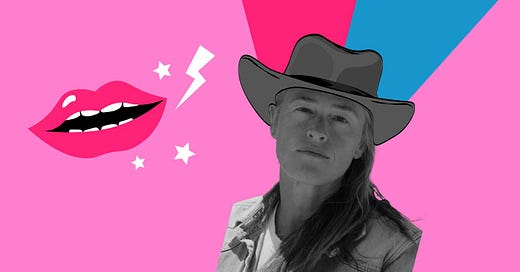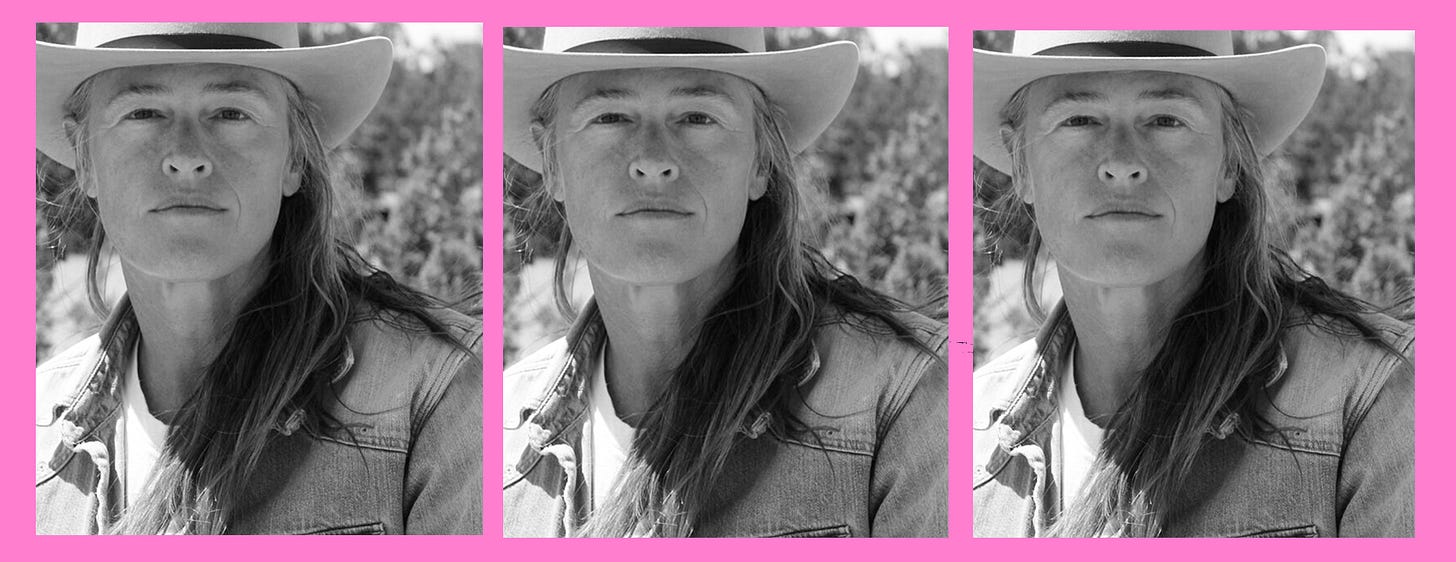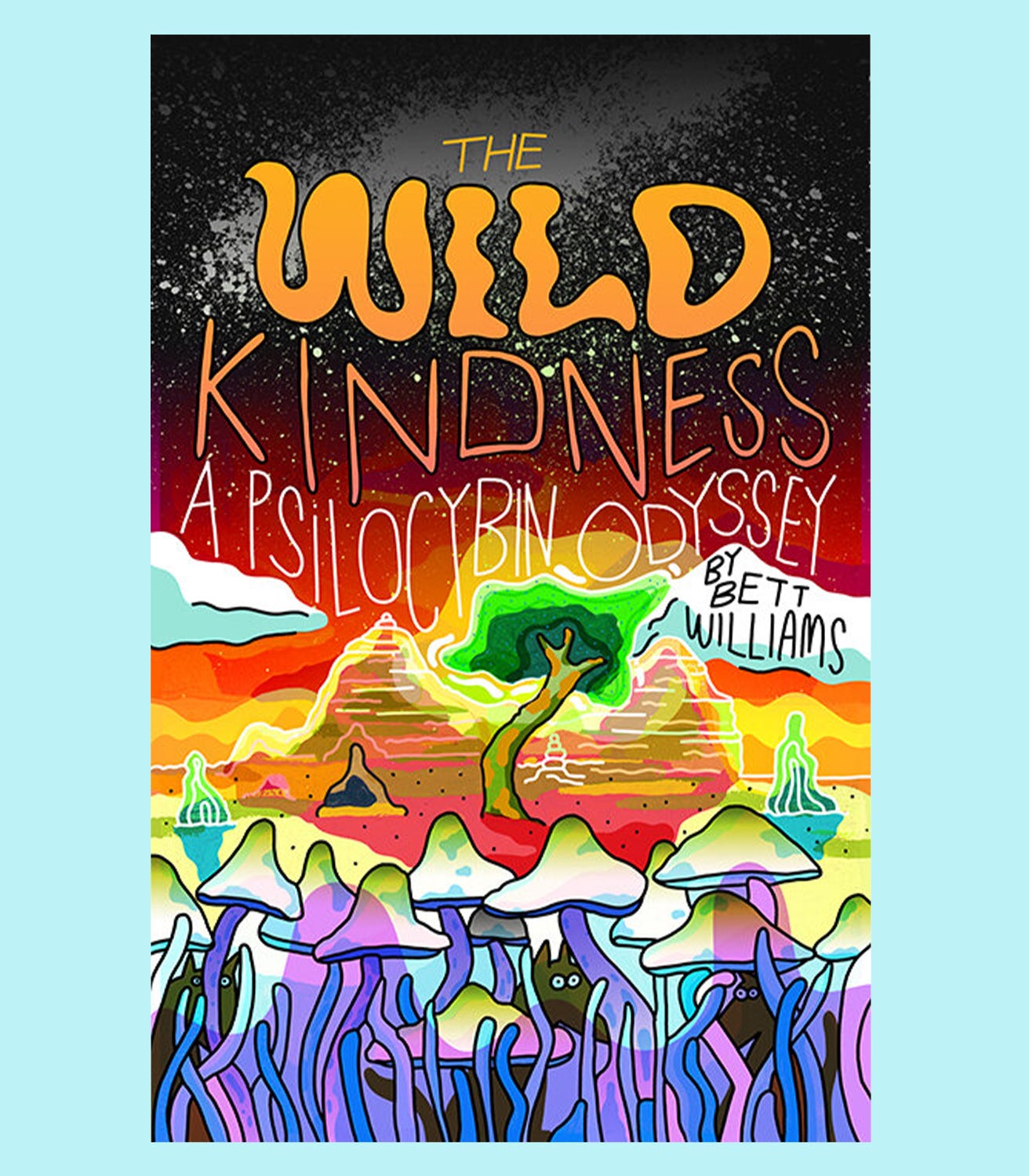Writer & Psychedelic Explorer, Bett Williams, TALKTALKTALKS Art & Mushrooms
Plus searching for Bigfoot, making art in Santa Fe, the problem with Beat poets, Gertrude Stein, Maria Sabina + more!
Bett Williams is a writer and psychedelic explorer who wrote a book about growing mushrooms and having adventures with her friends in the high desert of New Mexico. One of these friends is the multidisciplinary artist and writer Clement Goldberg, who introduced me to Bett’s book, The Wild Kindness — and, soon after, Bett herself.
The following conversation was conducted by email and touches on a myriad of topics, including: The Wild Kindness, Bett’s relationship to mushrooms, psychedelic culture, the energetics of fashion, and searching for Bigfoot! I’m sending out a public prayer for many, many, more TALKTALKTALKS with Bett.
This interview is a followup to a podcast recording that you can access here. Scroll down to watch the video.
Thank you thank you thank you to Clement for making this interview happen.
Vivi Henriette: In a recent conversation with astrology friends, someone said of the times ahead that humans will be forced to reconcile with all the nonhuman entities on this planet, and I immediately thought about your book, The Wild Kindness. Which is a book about mushrooms that feels like a book about reconciling with what it means to be human in a world full of nonhuman entities.
Do you agree with this interpretation? Do you agree with this prediction?
Bett Williams: This prediction reads like a Christian evangelical sentiment run through a Donna Haraway. purifier. A sense of original sin is inferred, the sinfulness being our self centered-ness as mere human beings. Firstly, I feel we never lost contact with the non-human. On some level, we know what’s going on, that we are all connected in what feels like mysterious ways. If we lived in that realization all the time we’d probably blow a circuit. We are self centered by design. When we hear about the intelligence of birds and the colors of sea creatures down so deep no one will ever see them, we feel smart and less alone. But awareness can also be self centered. It’s harder to just let something exist without needing to understand it. So this prediction speaks to some forced reconciliation on a mass scale? Who or what is doing the forcing? These words have military vibes. It’s too Book of Revelations with slime mold to sit well with me.
Vh: Well stated. What do the mushrooms tell you about the state of the world? Take that at whatever scale you wish.
BW: I did a high dose journey around the time Kilindi Iyi, a master practitioner out of Detroit died. An intricate language machine was superimposed on my house. Elves took my words and ran them through the machine to use for their own purposes. Kind of a bummer. I was told all the institutions of knowledge had crumbled. I wandered along paths where the free thinkers walked. We had just enough to survive. There was a giant black alien ship above me. It’s a dramatic time in history obviously, a time of great collapse and reorganization. The gaps and the in between zones are where it’s at. It’s dim but beautiful full of thin lines of bright colors and bulbous nodes that have an underwater quality. Those of us who haven’t become pawns of empire, zombies, iPhone programmed hommunculi, denizens of the city council and managerial arts can take a lot of pleasure in the blessing of being alive at this time. We wander. There’s so much that is unknown. We are rewarded for our courage.
Vh: How would you describe The Wild Kindness? What compelled you to write it?
BW: It’s a memoir about a time I grew mushrooms at home in the desert and all the things that happened. To actually finish a book I needed a topic I was ridiculously in love with to want to finish it.
Vh: Reporting from the field of my life, this book has acted as a mycelial network, connecting me to a whole cast of characters and experiences, It’s arrival led me to dating one of the book’s characters, moving across the country, and finding a flatmate, based, in part, over our shared love of your work!
Do you think there’s something to that? What have you unleashed?
BW: I’m so glad my book facilitated that! How cool! Books written by queers in love with language tend to do that! Make worlds. The book presented itself to me as a vision of spores disseminating themselves all over the place. I’d like to think the fact the main character is a mycelial organism allows the book to move through the world in a way that’s a bit extra.
Vh: The following question is a summary from the introduction to Mushroom People Magazine. With people looking to mushrooms for help with everything from fixing their mental, physical and spiritual health problems, providing packing solutions and cleaning up our oil spills, is it possible that we, as a collective, are asking too much from the mushrooms?
BW: Perhaps, yes, but I would rephrase it by saying we are asking too much from science. If there’s anything the last few years have revealed to me is that the scientific method isn’t what it’s cracked up to be. It’s a bit of a grift.
Vh: Following this thread, I’m thinking of Melvin Sheldrake’s book, Entangled Life: How Fungi Make Our Worlds, Change Our Minds & Shape Our Futures, and how his study of microbiome research put into question “our culturally treasured notions of identity, autonomy, and independence.”
Put another way: Is it accurate to speak of the individual if we’re all teeming with living creatures? Has your work with mushrooms led you to similar insights?
BW: Totally! The fierce examination of the human-centric biases within my own worldview is a worthy ceremony, always!
Vh: Do you ever think the mushrooms used you to write this book?
BW: I did. I felt I was chosen and called to write it by them. This feeling was reaffirmed every time I tripped. There are a billion mushroom influencers out there who feel the same way, that they were personally chosen. I guess it’s a feature not a bug.
Vh: In that sense, could we say that reading this book is a way to have a psychedelic experience? I’m thinking about people who maybe shouldn’t take psychedelics. Aside from being a captivating piece of literature, what do you think this book has to offer them?
BW: In The Wild Kindness I name a bunch of other books I call “psychedelic:” not all are about the substances and effects. For instance, I say Eileen Myles book, Afterglow, is psychedelic. It’s about their dog: it reads like an ecstatic download. But I try to keep the term psychedelic close to experiences with actual psychedelic drugs, if only to affirm that they are entities in their own right acting upon a person.
Two things that speak to what a psychedelic is experience, feels like - it’s a non specific amplifier. It evokes synesthesia. Lots of things can evoke this but the simple act of a chemical compound changing you, agreeing to this relationship, is one aspect that can’t be done without the drug. But that’s just one aspect of it.
“There’s a basic stance of deep humility the mushrooms have taught me. We are so limited, so dumb.”
Vh: I was listening to an interview where you were talking about a trip and the mushrooms talking to you and the interviewer said something about the trip connecting you to your unconscious and blah blah the iceberg analogue Freudians are always throwing about. Your response was something like, “Maybe and the mushrooms were talking to me.”
And I love that so much. This gentle reminder that it’s not all about us. Why do you think this is so hard for some people to understand?
BW: Yeah I was just reading my first novel, Girl Walking Backwards, for the first time since I wrote it in 1998 and in the first chapter the teenage main character is told by her therapist that everything in her dreams was just manifestations of her own self. I write - If everything you dream is just you, then where is the world in all of it? I guess this is my main theme. We contain multitudes within but it’s so important that we construct a coherent self.
I have a pretty loose sense of self. On a good day I’m happy with my input on who Bett Williams is. On a bad day I’m just a foot soldier for the psyops. There’s a basic stance of deep humility the mushrooms have taught me. We are so limited, so dumb. Psychology, the unconscious, whatever — you can have a rich psychedelic inquiry that doesn’t have anything to do with these concepts. An overwhelming experience of mystery within a non dualistic worldview is scary for most people.
Vh: In that same interview you say that there’s “a kind of prose that arose through the Beat poets, through Allen Ginsberg and Jack Kerouac, that informed me more than I realized…”
Driving across the country, listening to you read The Wild Kindness on Audible, I remembered the excitement that came from reading Kerouac — and then the disappointment that followed, when I stopped disassociating enough to realize how shitty he treated women and that I was, in fact, a woman. Have you ever had a moment like that?
BW: Totally! I demand my life force back from them that I may have offered in moments of my pagan habit of honoring the dead. Ever since writing the book I have rigorously interrogated the practice of citing the writers and thinkers of influence: we really freeze and attach a sus history to our current works when we do that. Think about who we leave out. The random holy woman we knew for a time whose name we can’t remember, who taught us something essential. We forgot her because she was not the type of woman to be remembered, to cite or have a Wikipedia page. I’m trying to write these people into existence now.
Vh: Speaking of names we leave out, I’m feeling like it’s improper to have this conversation without acknowledging Maria Sabina. Who is she to you?
BW: Maria Sabina is an icon, a saint, a pop star, an incomparable genius of language, sound, frequency and light traveling along the tributaries of world culture. She is a woman who knows what she is doing. In the current psychedelic movement there is this expectation to always refer to her in relation to Gordon Wasson, to see her as a victim of colonization. I have definitely promoted that narrative. This narrative is now being used by those who want to control and regulate how the mushrooms are taken and by whom, which is itself a colonization.
Vh: I found myself overcome with a profound joy reading your book! The parts where you talked about your friends and the writers who inspired you. I felt like a teenager again excited about life in such a big way. The feeling that there’s a whole world of magical possibilities, open to me — just as I am. Thank you for that.
Have you ever had a similar experience with a book or a piece of art or music or…?
BW: Two pieces of music come to mind that ran me over so hard - Crybaby by Lil Peep and La Vita by Beverly Glenn Copeland. My girlfriend Rosemary has written two zines this last year, Diogenes on the Road and another one on Sasquatch. I think it’s the most dazzling ecstatic smart funny and revolutionary shit I’ve ever read. Living in a culture where she sends these things off in little envelopes to be rejected by zine fests for the fact of their being without a genre or something is a vexing dilemma. It calls into question whether the current readers of the world are in love with language or just following directions from the algorithms.
Vh: Do you think it’s the algorithm or that most people have a hard time understanding anything without a structure? Even the Patron Saint of language poets, Gertrude Stein, struggled to attract a mass audience until the success of her novel, The Autobiography of Alice B Toklas. And she was a genius.
Agree? Disagree? Insights?
BW: I don’t think everyone has the same need or hunger for what Gertrude Stein does. Her words feed the ache of a mind beset by synesthesia, a spectrum-y vantage point. I’m noticing most people don’t even notice language or visual genius when it’s right in front of their face unless someone important tells them it’s great. No amount of mushrooms can help people like that, they are so programmed to find art in only that which they have been told is art. Gertrude Stein was recruited as part of a Cold War CIA culture op against communism. This is a documented fact. It took empire having her back for such experimental work to find its way to a mass audience.
The same thing with the mushrooms. In the same way I encourage people to engage with the mushrooms in spaces free of capitalist and political agendas, I am consciously doing the same with art right now - running a gallery and performance space out of my house with artists who may or may not be sanctioned by the current gatekeepers. It’s amazing who doesn’t come over. Like all the people you think would come don’t come. Hardly anyone comes over. It’s fascinating because I know who I am and I know the value of the work I am supporting, it’s life force, it’s pagan joy and medicine. It’s all right here if you want it. We need each other for it to happen though.
Vh: You mentioned Sasquatch in our podcast interview. What’s this all about? The zine and your interest.
BW: I’m interested in Sasquatch/Bigfoot because it’s actually really banal and kind of boring. Camping with Bigfoot people is also the whitest thing I’ve ever done. It’s a mimetic social world confined to camp sites mostly where everything is reduced to this cryptoid or interdimensional entity that reveals itself through stick glyphs, footprints, messed up trees and greasy hand prints and the outcome is a kind of ecstasy of right relationship. Rosemary uses the phrase, “the aesthetics of Bigfoot.” I have no idea what it’s all about and I guess that’s part of what makes it interesting to me.
Vh: This wasn’t supposed to be an interview about The Wild Kindness, but I guess it’s shaped out that way. As a final question on the subject, how have you changed since writing this book?
BW: I’ve changed a ton and then again hardly at all.
Vh: And finally, what’s catching your attention right now? What’s exciting? What’s next?
BW: Rosemary and I are heading out to Kyle, TX today for a month long residency put on by Tasajillo Ranch. I guess I’m writing another book? Ugh, makes me a little queasy to think about. We just opened up a gallery/performance space in Santa Fe called The Beach. I did a lot of work with concrete, tile and landscaping material this year like a crazed mason making his grotto, with like my earphones on listening to synchromysticism podcasts. That’s a happy place of inspiration right there.
Vh: How can people keep in touch?
BW: Go ahead and write me! williamsbett@yahoo.com
LISTEN to the TALKTALKTALK podcast w/ Bett HERE
STAY IN TOUCH: Visit the Bett’s website HERE and buy a copy of The Wild Kindness HERE.
FOLLOW ART of the ZODIAC & Vivi Henriette on INSTAGRAM + YOUTUBE + SPOTIFY for the latest TALKTALKTALK
Wanna support TALKTALKTALK? Make new friends? Learn Astrology? Subscribe to ART of the ZODIAC on PATREON.








